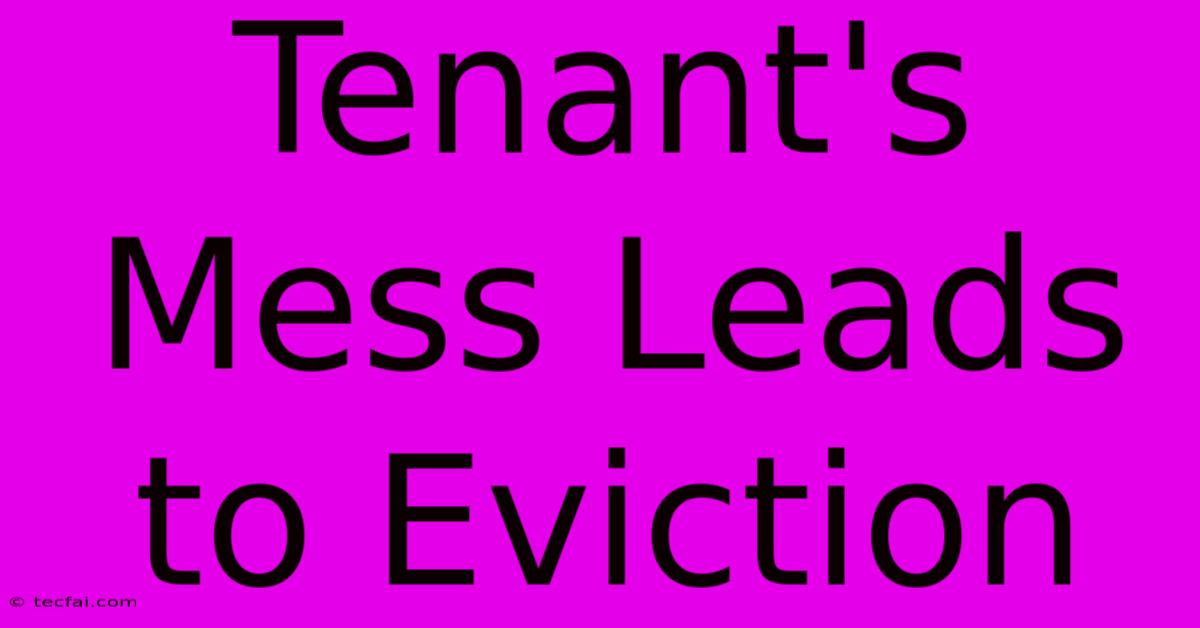Tenant's Mess Leads To Eviction

Discover more detailed and exciting information on our website. Click the link below to start your adventure: Visit Best Website tecfai.com. Don't miss out!
Table of Contents
Tenant's Mess Leads to Eviction: Understanding Your Rights and Responsibilities
A messy apartment might seem like a minor issue, but for tenants, it can lead to serious consequences, including eviction. While landlords want to provide comfortable living spaces, excessive messiness can cross the line from untidiness to a health and safety hazard, potentially jeopardizing the landlord's property and other tenants. This article explores the circumstances under which a tenant's mess can lead to eviction, outlining the legal framework and steps involved.
What Constitutes an Unacceptable Mess?
The definition of "excessive mess" varies depending on local laws and lease agreements. However, certain conditions consistently cross the threshold:
- Health and Safety Hazards: Accumulation of garbage, spoiled food, vermin infestation (rats, roaches, etc.), and unsanitary conditions pose significant health risks. These situations often violate building codes and health regulations, providing grounds for eviction.
- Fire Hazards: Hoarding of combustible materials, blocked exits, and improper storage of flammable items create dangerous fire hazards. Landlords have a legal duty to ensure the safety of their tenants and property, making fire hazards a serious concern.
- Damage to Property: Excessive clutter can lead to water damage, mold growth, or structural damage. For example, overflowing trash cans might leak, causing damage to floors and walls. The tenant is responsible for the cost of repairs in such instances.
- Violation of Lease Agreements: Most lease agreements include clauses regarding cleanliness and maintenance. Violation of these clauses can provide grounds for eviction, particularly if the tenant has been given adequate notice to remedy the situation.
The Eviction Process: A Step-by-Step Guide
Eviction for a messy apartment isn't immediate. Landlords must typically follow a specific legal process, often involving the following steps:
- Written Notice: The landlord will usually issue a written notice to the tenant, detailing the specific violations and providing a reasonable timeframe (typically 3-30 days, depending on the jurisdiction and the severity of the issue) to rectify the problem. This notice serves as a formal warning and documentation of the violation.
- Tenant's Response: The tenant has a chance to address the concerns outlined in the notice. Cleaning the apartment thoroughly and demonstrating a commitment to maintaining cleanliness is crucial during this period. Ignoring the notice or failing to comply can lead to the next step.
- Legal Action: If the tenant fails to remedy the situation within the specified timeframe, the landlord may file for eviction in court. The court will review the evidence, including the written notice, photos or videos of the condition of the property, and testimony from both parties.
- Court Hearing and Judgment: A court hearing will be scheduled. The tenant has the right to present their case and provide evidence supporting their argument. If the court rules in favor of the landlord, an eviction order will be issued.
- Eviction: Following the court's decision, the tenant must vacate the premises within a designated timeframe. Failure to comply with the eviction order may result in further legal consequences, such as removal by law enforcement.
Protecting Yourself as a Tenant
To avoid eviction due to messiness, tenants should:
- Read your Lease Carefully: Understand the clauses regarding cleanliness and maintenance.
- Maintain a Clean Apartment: Regular cleaning is essential to avoid accumulating excessive clutter or hazardous conditions.
- Address Problems Promptly: If issues arise (e.g., a clogged drain causing water damage), report them to your landlord immediately.
- Communicate with Your Landlord: Open communication can often resolve issues before they escalate into legal action. If you're struggling to maintain cleanliness, speak to your landlord about potential solutions.
Disclaimer: This article provides general information and should not be considered legal advice. Laws regarding tenant rights and eviction vary by jurisdiction. Consult with a legal professional for advice specific to your situation. Always review your lease agreement for specific details regarding cleanliness and maintenance expectations.

Thank you for visiting our website wich cover about Tenant's Mess Leads To Eviction. We hope the information provided has been useful to you. Feel free to contact us if you have any questions or need further assistance. See you next time and dont miss to bookmark.
Featured Posts
-
Cat Deeleys E27 H And M Festive Sweater
Nov 19, 2024
-
Edwards Player Props Chargers Vs Bengals
Nov 19, 2024
-
Knoe Forecast Strong Storms Sunday
Nov 19, 2024
-
Busted Live At Colchester Castle
Nov 19, 2024
-
Natuklasan Seahorse At Ang Kayamanan
Nov 19, 2024
